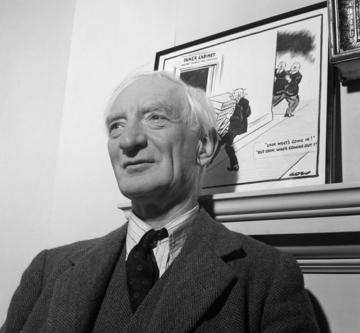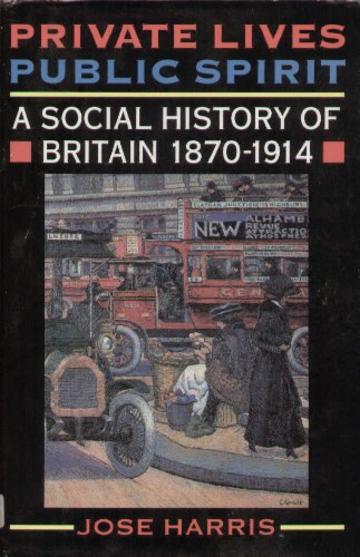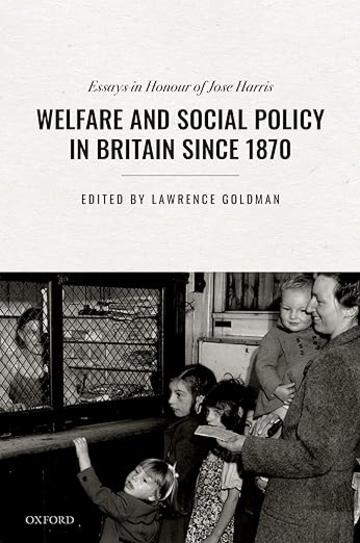Political Thought and the Welfare State: Jose Harris's History of Social Policy
The late, and much missed, Jose Harris was a hugely influential historian with wide-ranging interests. Jose’s life and work has been brilliantly related by Lawrence Goldman in his obituary of her for the Oxford History Faculty. Her legacy will rightly be the subject of many tributes and discussions to come. Here I want to highlight her contribution to the field of intellectual history and to give a concise account of what those of us who work on the modern history of ideas owe to her.

Jose Harris.
Although Jose’s PhD thesis was completed at Cambridge, she was supervised by Richard Titmuss, the legendary scholar of social policy from the LSE. Jose recalled that this unusual arrangement came about because the proponents of founding a sociology department in Cambridge thought that Titmuss might gradually be lured there full-time and that, as a sociologist with historical interests, he would represent a less frightening intellectual departure to the internal opponents of widening Cambridge’s social science teaching. In revised form her thesis was published as her first book, Unemployment and Politics: A Study in English Social Policy 1886-1914 (1972). It was a foundational work of a new field that started to take shape in the 1970s, the history of social policy, in particular what was beginning to be conceptualised as the ‘rise’ of the welfare state. Jose’s own distinctive contribution to this field was already evident in this book: she analysed the emergence of the modern concept of ‘unemployment’ and the new state policies that this conceptual shift elicited. To make this argument, she consulted an extraordinary range of government papers, official publications, works of social and economic theory, contemporary sociological studies and much else.
The book showed that the arrival of the word ‘unemployment’ in mainstream political debate in the late-nineteenth century marked a major change in how joblessness was conceived. Rather than a product of individual deficiencies that were the concern of local philanthropic efforts and moral reform, Jose documented that a new wave of expert opinion began to understand unemployment as the product of socio-economic conditions. There was now widespread agreement that the social harms caused by unemployment had been underestimated by earlier generations and that there was an obligation on the state to offer a national policy response. This transposition of unemployment policy from the sphere of local government and voluntary action to the national level marked a major shift in the role of the state and the arrival of social policy as a matter that would preoccupy high politics thereafter.
Jose stressed that this ‘national’ policy was different from the macroeconomic understanding of unemployment that had been cemented into state practice after the Second World War. Far from the post-1945 orthodoxy that the state should maintain employment levels by managing aggregate demand in the economy, unemployment in the Edwardian period was thought to require the state to smooth out imperfections in the labour market by offering unemployment insurance, labour exchanges, regulation of employment conditions, and only very limited public works programmes. Jose later wrote a brilliant essay, ‘The Transition to High Politics in English Social Policy’ (1983), which set out a general account of the causal forces that in her view had led to welfare politics moving to the heart of national political debate before 1914. Jose was clear that, while ideological change had played some role in driving a nationalisation of social policy, it was the economic pressures posed by a fiscal crisis in local government that ultimately precipitated the central state having to step in.

William Beveridge.
William Beveridge was a central player in the Edwardian debates about unemployment. It was therefore a natural next step for Jose to write a much-needed biography of this indispensable figure, who had died in 1963 as the revered founder of the welfare state. The first edition of William Beveridge: A Biography appeared in 1977, with a revised and updated second edition following in 1997. The book was published just as the so-called ‘Beveridgean welfare state’ was coming under serious political pressure from both left and right. Jose provided a cooler historical view of Beveridge and of the ideas that he championed throughout his life. There was much of interest about Beveridge as a person in the book, which was amplified in the second edition, when Jose was much less constrained by the insistence of the Beveridge family that she steer away from his private life. But Beveridge’s role as a theorist and administrator of social welfare formed the core of the biography, which used Beveridge as a case study in how the Edwardian logic of social welfare Jose documented in her first book fared in the interwar period and the 1940s. Beveridge was characteristically described by historians as a ‘Liberal’ (like Keynes, with whom he was often paired as an intellectual architect of middle of the road welfare capitalism). But Jose probed beneath this label to expose the complex mix of positivism, idealism, classical republicanism and, by the 1940s, outright socialism that shaped his thinking. Beveridge emerged not as the advocate of capitalism with a human face but of an austere idea of citizenship and social service. He regarded social insurance and public services as the means to realising the civic community that had been ripped apart by poverty in the interwar years. The experience of the Second World War, Jose showed, led Beveridge to believe that new forms of state planning would be required to achieve this ideal, encompassing not only social insurance and a new health service but also some public ownership, controls over investment, and state-guaranteed full employment.
Historians who write on the welfare state are sometimes criticised for romanticising their subject, even for ascribing an exaggerated historiographical importance to it. This was avowedly not the case with Jose. She argued that a key insight of studying Beveridge was that the actually existing British welfare state never lived up to his highest aspirations. On the contrary, it was less well-funded and less universal than the welfare states in other European democracies. This was Jose’s convincing riposte to right-wing ‘declinists’ such as Corelli Barnett. Barnett attributed Britain’s loss of geopolitical and economic power after 1945 to figures such as Beveridge, who had purportedly directed the state into a welfarist cul-de-sac rather than focusing on reviving British industry. Jose was clear-eyed in observing that Britain’s welfare state remained fundamentally influenced by the tradition of the Poor Law – with a central role for means-tested benefits – even in its purported mid-twentieth century golden age.
Jose’s third book was Private Lives, Public Spirit (1993), a social history of Britain between 1870 and 1914. This was a hugely impressive account of key aspects of social life in this period, covering such issues as demography, family life, property, and religion. It was notable for the way in which Jose captured the rich complexity of life in this period. However, it also advanced a central argument, namely that the late nineteenth century rather than either of the two world wars should be seen as the crucial formative period for British society before the 1960s, with the emergence of modern demographic and family patterns, mass production and consumption, class structures, and heightened imperialism. There was a significant amount of intellectual history in this book as well: Jose’s account of social history was closely interwoven with the texts and discourses of the period. The final chapter of the book broached changes in social theory directly.

Jose Harris, Private Lives, Public Spirit: A Social History of Britain, 1870-1914 (Oxford, 1993).
In this chapter and then in a series of seminal articles published in the later part of her career, Jose turned her attention to the question: what precisely were the theories that had influenced Beveridge and the other founder of social welfare policy? This was in part a return to the question that she had answered more briefly in earlier work: why exactly did social policy become a central concern of the British state in the early twentieth century? But now she phrased the question differently: given that social policy was placed on the agenda of many industrialised states in that period by material and functional pressures, why did the British welfare state take the peculiar form that it did: centralised, national in scope, highly bureaucratic in character? Here she argued that political ideas should bear some of the explanatory weight.
The formation of Britain’s welfare state was, she thought, closely connected to a social reforming culture that was idealist and organicist in its theoretical assumptions. Jose did not mean that the participants in this culture would all necessarily have self-identified as philosophical idealists in a technical sense. Rather, she saw them as sharing a commitment to the creation of an ideally just state that would realise the common good, active citizenship, and a ‘positive’ conception of liberty. She showed that these ideas had a much wider cultural resonance than their discussion in philosophical treatises written by figures such as T. H. Green and Bernard Bosanquet, the form in which British idealism had until then largely been studied by intellectual historians and philosophers. Jose argued that idealism had been disseminated by the school system, in periodicals and the press, and by numerous university departments, especially the new social science departments that were created before the First World War to train social workers and investigators. Influenced less by Hegel and more by Rousseau, Aristotle and Plato, this idealism formed the intellectual framework of a generation of thinkers and activists who engaged with social problems, from the fiercest advocates of a large social state, such as the Webbs, to their seeming polar ideological opposites, such as the devotees of the Charity Organisation Society (COS). The COS, Jose argued, had been misrepresented as exponents of laissez-faire capitalism when in fact they hewed to a Rousseauian vision of using the state to force the poor to become free, independent citizens.

Jose Harris's festschrift: Welfare and Social Policy in Britain since 1870 (Oxford, 2019).
The heyday of idealism continued into the interwar years but by the end of the Second World War in Jose’s view it had begun to decay as a unifying ideological language for social policy. The theory of the state that underpinned the social reforms of the 1940s was a broadly idealist one. It recommended an increased role for the state on the grounds that this would advance the larger ethical goals prized by Beveridge and his generation of reformers. But this last hurrah was followed by the rise of political discourses that undercut the foundations of idealism and downplayed the importance of ethical language altogether: the determinist Marxism of the mid-twentieth century; a positivistic and technocratic model of social science; a linguistic philosophy that explicitly styled itself as dispensing with discredited idealist assumptions. Jose suggested that due to this intellectual context the years after the 1940s were notable for the absence of systematic theoretical reflection on the aims of the welfare state.
As a consequence, such policies took on a technical, seemingly pragmatic character that left social welfare as the province of credentialed experts and state officials rather than as the proper concern of civic debate (here she had in mind experts such as her former PhD supervisor, Richard Titmuss). This left the welfare state vulnerable to attacks from the stronger theoretical positions on both left and right that developed in the late twentieth century. The stripping away of some of the British state’s welfare functions in the 1980s and 1990s, Jose thought, was partly a story about the defenders of the welfare state lacking a principled, culturally powerful rationale for its existence as opposed to ad hoc arguments drawing on positivist or quasi-utilitarian assumptions. This was a fascinating and provoking interpretation, which bore some comparison with the argument famously made by Alasdair MacIntyre in After Virtue (1981) about the breakdown of modern ethical theory due to Enlightenment individualism. Like MacIntyre, Jose depicted contemporary technocratic policy-making discourse as a collage of fragmentary concepts wrenched from their theoretical context and sought to recapture the full theoretical traditions within which these ideas were developed. But Jose’s argument was more historically precise than MacIntyre’s: she did not offer a jeremiad about all of modernity but rather a detailed historical claim about twentieth-century British intellectual culture.
Jose was a pioneering exponent of what is now, partly thanks to her efforts, historical common sense: that the study of ideas is an integral part of the study of twentieth-century society and politics. Her work demonstrated that ideas can be traced not only in small circulation theoretical treatises by high profile individual thinkers but in broader social debates and even amid the forbiddingly technical realm of modern official enquiries and bureaucratic decision-making. We will miss her voice in the debates to come, but she has left us with an unrivalled legacy to build on.
Ben Jackson is Professor of Modern History at Oxford University. He taught classes at Oxford with Jose Harris for several years on the history of political thought and on reconstruction debates during the Second World War.
Bibliography of works by Jose Harris referenced in this article
(A full list of her publications can be found here)
Unemployment and Politics: A Study of English Social Policy, 1886-1914 (1972)
William Beveridge: A Biography (1977, second and revised edition, 1997)
‘The Transition to High Politics in English Social Policy, 1880-1914’, in J. Stevenson and M. Bentley (eds.), High and Low Politics in Modern Britain (1983)
‘Enterprise and Welfare States: A Comparative Perspective’, Transactions of the Royal Historical Society, 40 (1990)
‘Political Thought and the Welfare State 1870–1940: An Intellectual Framework for British Social Policy’, Past & Present, 135 (1992)
Private Lives, Public Spirit: Britain 1870-1914 (1993)
‘Platonism, Positivism and Progressivism: Aspects of British Sociological Thought in the Early Twentieth Century’, in E. Biagini (ed.), Citizenship and Community: Liberals, Radicals and Collective Identities in the British Isles, 1865–1931 (1996)
‘Political Thought and the State’, in S. Green and R. Whiting (eds.), The Boundaries of the State in Modern Britain (1996)
‘From Poor Law to Welfare State? A European Perspective’, in D. Winch and P. O’Brien (eds.), The Political Economy of British Historical Experience, 1688-1914 (2002)
‘Citizenship in Britain and Europe: Some Missing Links in T. H. Marshall's Theory of Rights’, ZeS Working Paper No. 2 (2010), University of Bremen, at https://d-nb.info/1190986051/34


